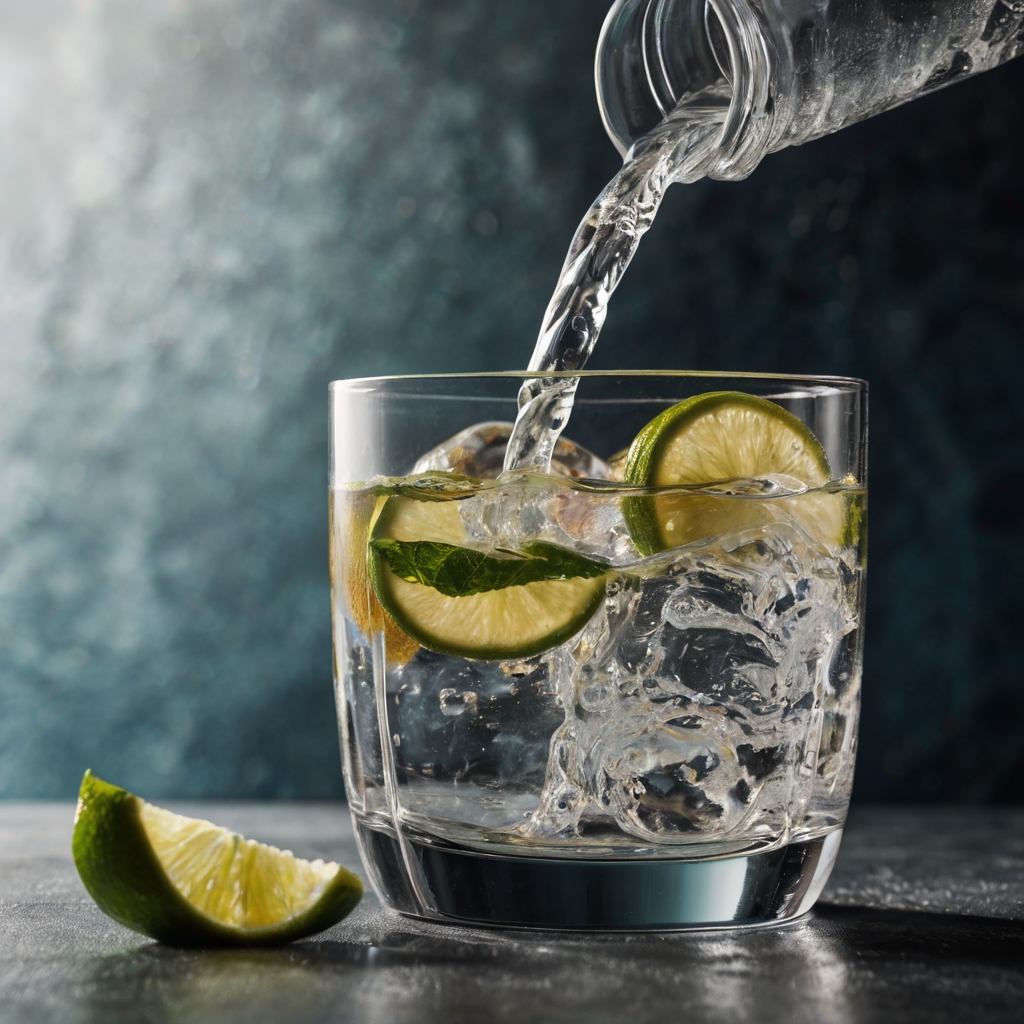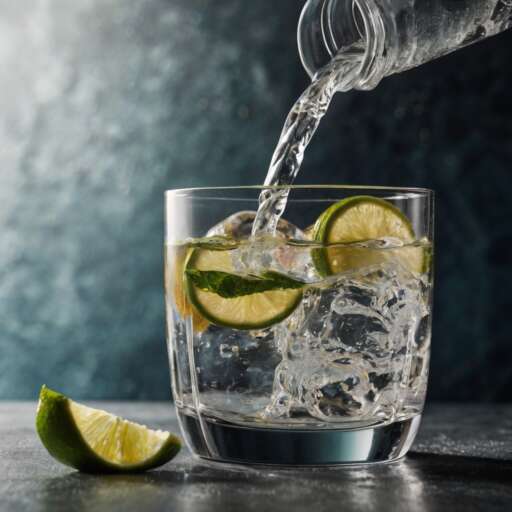The story of quinine in tonic water as a malaria treatment is the sort of thing I love. Many people ask if modern tonic water offers any health benefits. This fizzy drink gets its quinine from the cinchona tree’s bark, though it contains much less than actual medicine does. The FDA lets manufacturers add up to 83 parts per million of quinine, which most people can safely consume. Traditional tonic water dominates the market at 75%, while low-calorie options make up the other 25%. Sugar or high fructose corn syrup adds calories to this drink. Some folks think over using tonic water’s quinine to ease nighttime leg cramps. The FDA hasn’t approved this use yet and scientists need to research it more. Tonic water tastes refreshing and has quite a legacy, but its quinine can cause problems. Side effects range from mild nausea to serious issues in rare cases. Last year alone, people reported 71 bad reactions.
Table of Contents
- 1
- 2 What is tonic water and why is it popular?
- 3 What does quinine do in the body?
- 4
- 5 Is tonic water good for your health?
- 6 Who should avoid tonic water and why?
- 7 Risks of overconsumption: What doctors want you to know
- 8 In a few words
- 9 Here are some FAQs about if is tonic water good for you:
- 9.1 What are the benefits of drinking tonic water?
- 9.2 What does quinine do for the body?
- 9.3 Is it OK to drink tonic water every day?
- 9.4 Is tonic water better for you than soda?
- 9.5 Is it OK to drink tonic water straight?
- 9.6 Why would a doctor recommend tonic water?
- 9.7 Why is quinine banned in the US?
- 9.8 Who should not drink tonic water?
- 9.9 What are the negative effects of quinine?
What is tonic water and why is it popular?
Tonic water is a special carbonated drink that started as medicine and became a favorite mixer in today’s cocktail world. This clear, bubbly drink contains quinine, which gives it a bitter taste that makes it different from other sodas and sparkling waters.
The role of quinine in tonic water
Quinine, which makes tonic water what it is, comes from the cinchona tree’s bark native to South America’s Andes region. The original compound was a vital medical treatment – the only way to fight malaria from the early 1600s through World War II. British colonial soldiers in India and Africa used it to stay safe from this deadly disease.
Europeans mixed quinine with water and sugar to make the bitter medicine easier to drink. When carbonated water became popular in the 18th and 19th centuries, they added bubbles and created what we know as tonic water today.
The original tonic waters had powdered quinine, sugar, and soda water. The recipe changed over time, but the simple ingredients stayed the same. Today’s tonic water has nowhere near as much quinine as its medicinal ancestors. The FDA limits quinine to 83 parts per million (83 mg per liter). European regulations allow up to 100 mg/L.
How tonic water is different from other carbonated drinks
Tonic water’s bitter-sweet flavor profile sets it apart from other carbonated beverages. Master blender Giuseppe “Beppe” Musso says, “Unlike club soda, which simply adds refreshing bubbles to top off a drink, tonic water is characterized by slightly bitter and citrusy notes”.
These are the main differences:
- Composition: Sparkling water is just carbonated water, while tonic water has quinine, sweeteners (sugar or high-fructose corn syrup), and sometimes extra flavors.
- Taste: Tonic water brings a complex bittersweet flavor, but club soda and seltzer taste neutral.
- Nutritional profile: A standard 8 oz serving of tonic water has about 83 calories and 21.5g of sugar. This makes it more like a soda than plain carbonated water.
- Usage: People mostly mix it with alcoholic drinks, especially gin, vodka, and more recently, tequila.
Tonic water’s popularity has grown beyond gin and tonic. Industry experts note that people are “trying it with other spirits and even drinking it by itself”. The market now includes flavored tonics like rhubarb and raspberry, which appeal to younger people who want “longer, lighter drinks without losing flavor”.
Tonic water works well in non-alcoholic drinks too. Coffee tonic – a mix of tonic and coffee – has become trendy. Both drinks are seen as having “strong functional benefits, combining quinine’s natural benefits with tamarind and coffee’s energy-boosting properties”.
Is Indian tonic water good for you?
“Indian tonic water” gets its name from colonial India’s history and doesn’t mean it has special health properties. Modern tonic water, whatever the brand, has very little quinine compared to medicine. While adults need 2,100 mg daily to prevent malaria, tonic water only has 83 mg per liter.
Tonic water isn’t as healthy as some people think. Some drink it to help digestion or stop leg cramps at night, but there’s little science to back this up. Doctors usually warn against using it as medicine because it has lots of sugar – about 32g per 12 oz serving (like 8 teaspoons of sugar).
Diet versions with artificial sweeteners make up about 25% of the market. These work well for people watching their sugar intake. Notwithstanding that, health authorities still say plain water is best for staying hydrated.
What does quinine do in the body?
The natural compound quinine has a fascinating story in human health. Its medicinal uses stretch back through history and continue today. Let’s learn about how this bitter substance affects our body and why it remains both valuable and concerning.
Quinine’s origin and medical use
Quinine comes from the bark of the cinchona tree that grows in central and South America, Western Africa, and the Caribbean islands. Scientists first developed it as a medicine to curb malaria in the 1600s. This marked the first time doctors successfully used a drug to treat human infectious disease. The compound stops malarial parasites from growing and reproducing inside red blood cells.
Medical doses of quinine kill the Plasmodium falciparum parasite that causes malaria. Patients’ symptoms quickly improve as the parasites leave their blood. These days, we used it as a backup treatment option for malaria since newer medications with fewer side effects exist.
The story of quinine and malaria stands out as the first time anyone used a chemical compound to curb an infectious disease. Before scientists created alternatives in labs, this natural remedy saved countless lives. It was the only treatment that worked against malaria for over 300 years.
Is tonic water with quinine good for you?
In stark comparison to this, tonic water with quinine isn’t much of a health booster. Commercial tonic water can only contain 83 parts per million of quinine (83 mg per liter). This amount is nowhere near what doctors prescribe. Malaria treatments need about 540 mg of quinine three times each day.
Some people think tonic water helps with nighttime leg cramps. All the same, science hasn’t proven this works, and the FDA hasn’t approved it. The FDA actually warns against using quinine to treat leg cramps because the risks outweigh any benefits that haven’t been proven.
From a health viewpoint, regular amounts of tonic water are safe for most people. You probably won’t notice side effects from the small amount of quinine in a standard serving. But if you have certain health conditions or take specific medications, you should be careful. Even tiny amounts might cause bad reactions in some people.
FDA regulations on quinine in beverages
The U.S. Food and Drug Administration keeps a close watch on quinine in beverages. The FDA caps quinine in tonic water at 83 parts per million. Companies must also clearly show quinine on their labels, either in the product name or as a separate note.
These rules show the FDA’s strong position on quinine. The agency banned quinine from over-the-counter leg cramp medicines in 1994 because of safety concerns. Later in 2006, the FDA told companies to stop selling unapproved quinine products.
The FDA’s Adverse Events system shows 71 people reported bad reactions to quinine in 2021. Since the 1970s, 1,743 cases have been reported. These reactions range from mild issues like nausea and stomach cramps to serious problems with kidneys, heart rhythm, and bleeding.
The rules today say quinine is safe at low levels in tonic water for most people. But the FDA recognizes it could be risky in larger amounts or if you’re sensitive to it.
Is tonic water good for your health?
Tonic water’s name hints at health benefits, but questions linger about its role in a balanced diet. Many people don’t know if this popular mixer offers any real health advantages beyond its taste.
Benefits of tonic water: myth vs. reality
The truth about tonic water might surprise you – it has no proven health benefits. People drink it thinking it helps digestion or soothes upset stomachs. Science doesn’t back these claims. Many believe tonic water treats nighttime leg cramps or restless leg syndrome. The National Library of Medicine warns against using quinine for leg cramps. It could pose health risks without any real benefits.
Is tonic water good for you to drink regularly?
The sugar content in tonic water should make you think twice. A 12-ounce serving packs 32 grams of sugar – that’s 8 teaspoons. Regular sodas have about 37 grams or 10 teaspoons. People who keep taking tonic water might face these health risks:
- Increased risk of heart disease
- Higher diabetes risk
- Weight gain
- Kidney disease and kidney stones
The word “water” in its name is misleading – tonic water acts more like a soda than a hydrating drink. The American Heart Association suggests plain water as the better choice since it has no calories or sugar.
Is sugar free tonic water good for you?
Sugar-free tonic water solves the calorie and sugar problems of regular versions. But these products use artificial sweeteners like saccharin that come with their own concerns. Schweppes Diet Tonic Water contains sodium saccharin (5.0 mg per fluid ounce). Diet versions often have more sodium than regular ones. Schweppes Diet Tonic Water has 105 milligrams of sodium per serving – almost double the regular version.
Is diet tonic water good for you?
Diet tonic water gives you a zero-calorie option, but brands differ in their nutrition facts. Some brands show about 5 calories per fluid ounce, while others claim zero calories in a 12-ounce serving. Research shows artificial sweeteners might increase appetite and cause weight gain, though studies aren’t conclusive. Diet tonic water beats regular tonic water if you watch your calories. Plain water remains your best bet for daily hydration.
Who should avoid tonic water and why?
Many people enjoy tonic water’s distinctive flavor. However, some people should be careful or avoid it because of its quinine content. Commercial beverages contain small amounts that can trigger adverse reactions in vulnerable people.
Health conditions affected by quinine
Several medical conditions make tonic water dangerous. Pregnant or nursing mothers should avoid quinine-containing products because this compound passes through the placenta and might cause birth defects. People with abnormal heart rhythms face higher risks, especially when you have prolonged QT intervals, since quinine might worsen these conditions.
People with liver or kidney problems should stay away from quinine because these organs help remove it from the body. Quinine poses special risks to people with glucose-6-phosphate dehydrogenase (G6PD) deficiency and can trigger serious reactions.
Anyone with a history of thrombocytopenia (low platelet count) or other blood disorders must avoid quinine. This substance causes drug-induced thrombocytopenia and remains the leading cause of drug-induced microangiopathy. Previous adverse reactions to quinine mean you should never take it again, regardless of the amount.
Drug interactions to be aware of
Quinine interacts with 487 drugs – 95 major, 377 moderate, and 15 minor interactions. These medications need careful monitoring:
- Blood thinners (increased bleeding risk)
- Antidepressants (potential heart rhythm issues)
- Antibiotics (reduced effectiveness)
- Statins (increased side effects)
- Seizure medications (altered effectiveness)
Doctors recommend telling your healthcare provider about all medications before taking products with quinine. The FDA now only approves quinine to treat malaria, not leg cramps or other common uses, because of its extensive side effects.
Is tonic bad for you if consumed daily?
Daily tonic water might create health risks, particularly in sensitive people. Quinine can trigger immune-mediated reactions that affect multiple organ systems, sometimes after minimal exposure from regular beverages. The FDA limits quinine in tonic water to 83 mg/L, which stays substantially below therapeutic doses (500-1,000 mg).
Some documented cases show how regular tonic water led to kidney damage and neurological effects. One patient needed dialysis for two months after a severe quinine-induced reaction from tonic water and still has cognitive processing problems today.
Most healthy adults without contraindications can drink tonic water occasionally with minimal risk. However, drinking it daily increases your chances of developing sensitivity or experiencing adverse effects over time.
Risks of overconsumption: What doctors want you to know
Medical professionals have documented quinine’s potential risks for years, even in the small amounts you find in tonic water. This knowledge helps people make better choices about their drinks.
Mild side effects of quinine water
Most people can drink tonic water occasionally without problems. But sensitive individuals might get mild reactions like nausea, stomach cramps, diarrhea, and vomiting. Quinine can trigger ringing in the ears (tinnitus), confusion, and nervousness in some people. These symptoms show up more often with medicinal quinine than with tonic water.
People who keep taking tonic water should think over the extra sugar and calories they consume. Soft drinks, including tonic water, add to daily calories without much nutritional benefit.
Severe reactions and rare complications
Quinine sometimes triggers serious health emergencies. The FDA’s Adverse Events system recorded 71 cases of bad reactions to quinine in 2021, with 1,743 total cases since the 1970s.
The most serious risks include:
- Thrombocytopenia: Quinine leads to drug-induced low platelet counts and remains the most common cause of drug-induced microangiopathy.
- Kidney damage: Patients have suffered acute kidney injury and renal failure.
- Cardiovascular issues: Unusual heartbeats and QT prolongation can develop.
- Blood disorders: Some rare cases show disseminated intravascular coagulation (DIC), where blood clots form throughout the body.
Some people have genetic traits that make them unable to handle even tiny amounts of quinine. Research shows sensitive individuals experienced liver toxicity after exposure to quinine in tonic water.
Case study: Quinine-induced health emergencies
The story of one woman shows how dangerous quinine can be. She developed thrombotic microangiopathy (TMA) after a single sip of vodka tonic at her office party. Her symptoms started with chills, muscle aches, and stomach cramps. Soon she had fever and kidney damage that needed dialysis for two months. Seven years after this whole ordeal, she still had trouble finding words during conversations.
Another patient’s case proved equally serious. A man got DIC from drinking tonic water. He noticed easy bruising and bleeding gums for two weeks. His condition became so severe that he needed blood transfusions when his hemoglobin dropped to 6 g/dL. His health improved only after he stopped drinking tonic water.
These examples show that quinine can trigger severe immune reactions in some people, even from small amounts in everyday drinks.
In a few words
Tonic water has a fascinating history that transformed it from a medicinal remedy to a popular mixer. The evidence shows that its name hints at health benefits, but tonic water offers little value while posing risks if you have certain conditions.
Plain soda and tonic water share similar nutritional profiles. A 12-ounce serving packs 32 grams of sugar. Quinine levels in commercial tonic water stay below therapeutic doses, but sensitive people might experience anything from mild discomfort to serious complications.
People with abnormal heart rhythms, liver or kidney problems, or G6PD deficiency should stay away from tonic water. The same goes for anyone taking any of the 487 medications that clash with quinine.
Diet versions give options to people watching their calories. These products contain artificial sweeteners that need careful consideration. Health authorities agree that plain water is the best choice for daily hydration.
Past cases of severe reactions from even small amounts in common drinks remind us that natural compounds can be risky. Most healthy adults can enjoy tonic water now and then, but drinking it daily might lead to developing sensitivity.
Tonic water works best as an occasional treat rather than a health drink. Knowing its background and what it all means helps people choose wisely about this unique beverage’s place in their diet. This drink deserves respect for its cultural impact and pharmacological strength, whether mixed with gin or sipped alone.
Here are some FAQs about if is tonic water good for you:
What are the benefits of drinking tonic water?
Tonic water contains quinine, which historically helped treat malaria and may offer mild muscle relaxant properties (is tonic water with quinine good for you). The carbonation can aid digestion, and sugar-free versions provide a low-calorie alternative to soda (is sugar free tonic water good for you). However, most commercial tonic waters contain minimal quinine and shouldn’t be considered a health tonic (is indian tonic water good for you).
What does quinine do for the body?
Quinine has antimalarial properties and may help reduce nighttime leg cramps (is tonic water with quinine good for you). It works by interfering with parasite reproduction in malaria cases and affecting muscle contractions (is tonic water good for you). The amount in commercial tonic water is much lower than therapeutic doses, offering limited benefits (is indian tonic water good for you).
Is it OK to drink tonic water every day?
Moderate consumption of regular tonic water is generally safe, but the sugar content can add up (is tonic water good for you). Diet tonic water is a better daily option, though the quinine content still warrants caution (is diet tonic water good for you). Those sensitive to quinine or with certain medical conditions should limit intake (is sugar free tonic water good for you).
Is tonic water better for you than soda?
Sugar-free tonic water is marginally better than regular soda due to lower calories and added quinine (is sugar free tonic water good for you). However, regular tonic water contains comparable sugar to soda, negating most health advantages (is tonic water good for you). Both should be consumed in moderation as neither offers significant nutritional value (is diet tonic water good for you).
Is it OK to drink tonic water straight?
Drinking tonic water straight is safe in moderation, though the bitter quinine flavor may be unpalatable to some (is indian tonic water good for you). Straight consumption increases quinine intake, which could cause side effects in sensitive individuals (is tonic water with quinine good for you). Most people prefer it mixed with spirits or as a spritzer with citrus (is tonic water good for you).
Why would a doctor recommend tonic water?
Doctors might occasionally suggest tonic water for mild leg cramps due to its quinine content (is tonic water with quinine good for you). Some recommend the carbonation for temporary relief of nausea or indigestion (is tonic water good for you). However, therapeutic quinine doses require prescription, not commercial tonic water (is sugar free tonic water good for you).
Why is quinine banned in the US?
Quinine isn’t banned, but the FDA restricts prescription use due to potential serious side effects (is tonic water with quinine good for you). Over-the-counter quinine supplements were banned in 1994, while tonic water’s low concentration remains approved (is indian tonic water good for you). The restrictions aim to prevent misuse while allowing minimal amounts in beverages (is tonic water good for you).
Who should not drink tonic water?
People with quinine sensitivity, heart conditions, or kidney problems should avoid tonic water (is tonic water with quinine good for you). Pregnant women and those on certain medications (like blood thinners) should also exercise caution (is sugar free tonic water good for you). Anyone with glucose intolerance should opt for sugar-free varieties (is diet tonic water good for you).
What are the negative effects of quinine?
Quinine can cause cinchonism (tinnitus, headache, nausea) in high doses (is tonic water with quinine good for you). Serious risks include blood disorders, irregular heartbeat, and severe allergic reactions (is tonic water good for you). While tonic water contains minimal quinine, excessive consumption could potentially trigger these effects (is indian tonic water good for you).



